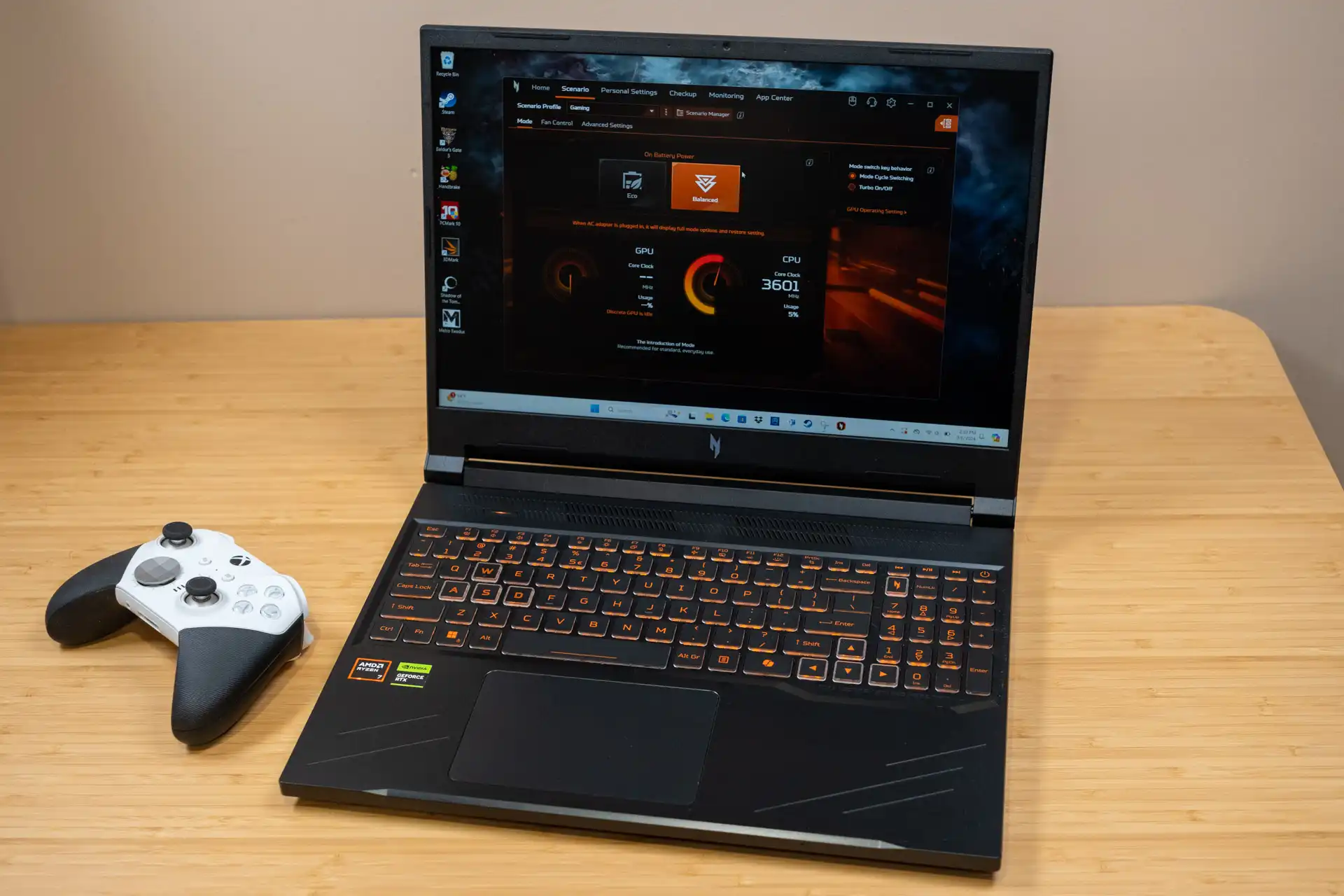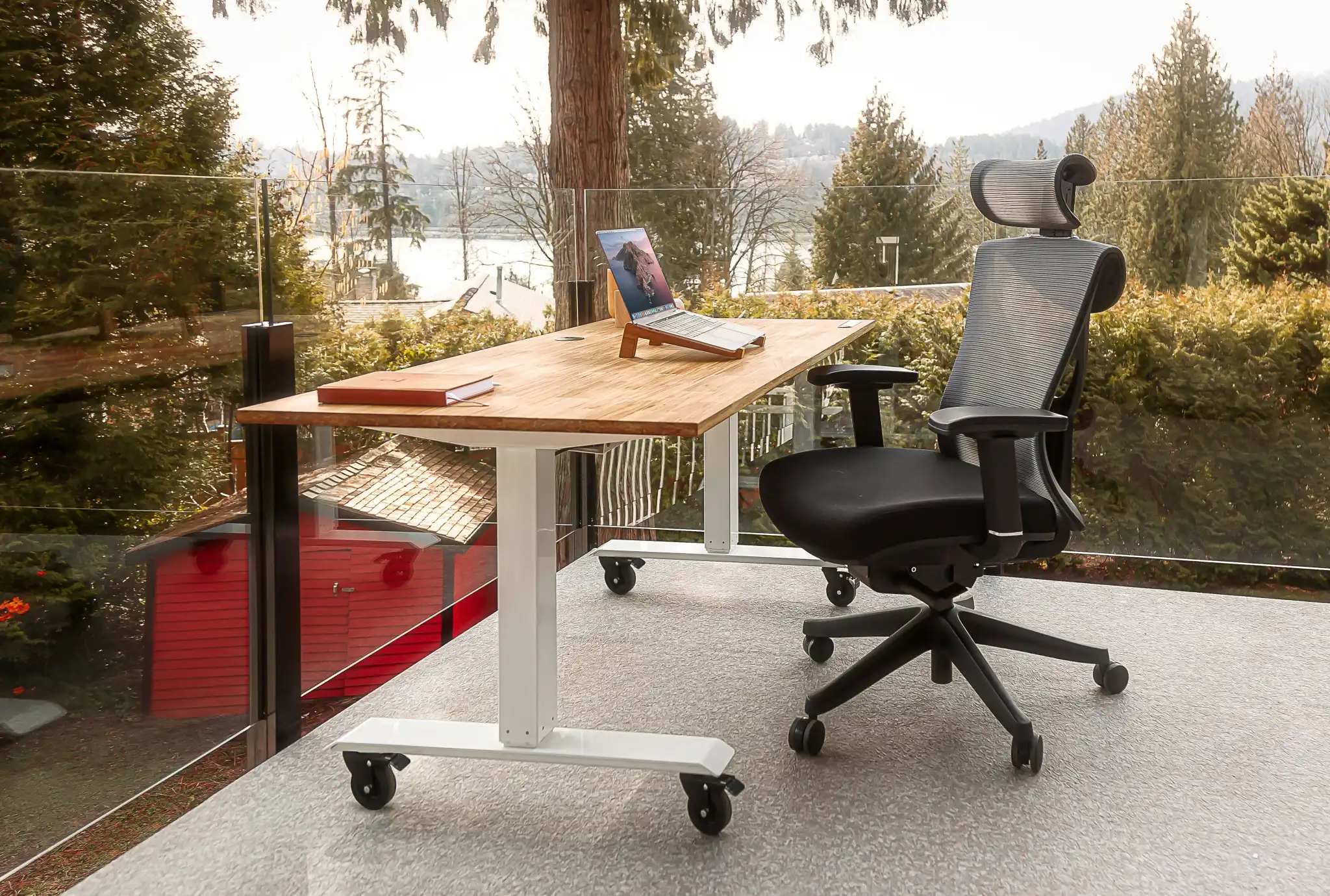Good performance at a great price.
In the past, gaming laptops could never hope to keep up with desktop gaming rigs, but the latest multi-core CPUs and pixel-pushing GPUs in laptops can make even the most demanding AAA games playable on the go. However, you’ll pay handsomely for the privilege, with high-end gaming laptops running thousands of dollars. If you don’t want to spend that much, laptops like the Ryzen-powered Acer Nitro V 16 could be just what you need. It’s got everything you need and nothing you don’t.
This machine sports a capable RTX 4060 GPU and an eight-core Ryzen 7 8845HS processor. Combine those with a fast IPS display, and you have a solid gaming experience for around $1,000. However, you won’t find much use for the Acer Nitro V 16 beyond gaming due to its poor battery life and obvious gamer aesthetic.
Acer Nitro V 16: Specs and features
The Nitro V 16 runs on the eight-core AMD Ryzen 7 8845HS CPU, which was launched in late 2023. AMD has since launched a new generation of laptop Ryzen chips with more AI chops, but that’s not a problem for the V 16. This machine also has an Nvidia GeForce RTX 4060 GPU, which can process more AI workloads than a CPU if the need arises.
The GPU is capable of running any modern game. While the resolution of 1920×1200 isn’t exceptionally high in 2024, it pairs well with the RTX 4060 to run games with medium or high settings at native resolution. The 16GB of included DDR5 RAM is also sufficient for mid-range gaming, but it’s light for creative work. If these specs don’t work for you, the Nitro V 16 may not be the right machine.
While the Acer Nitro 14 has similar specs, it’s a little more powerful and expensive. The 16-inch model only has a few minor spec variants, with a starting MSRP of $999.99. That’s cheaper than most RTX 4060 gaming machines, but the base model only has 8GB of RAM. I tested the 16GB version (priced at $1,099.99), which is the minimum memory allotment you should consider in 2024. The good news is this version of the machine is often discounted below $1,000.
- CPU: AMD Ryzen 7 8845HS
- Memory: 16GB DDR5
- Graphics/GPU: Nvidia GeForce RTX 4060
- Display: 16-inch 1920×1200 IPS @ 165Hz
- Storage: 1 TB PCIe Gen4 NVMe M.2 SSD
- Webcam: 720p
- Connectivity: 1x USB-C (USB4, 40Gbps), 2 x USB-A 3.2 Gen 2 (10 Gbps), 1x HDMI 2.1, 1x Ethernet, 1x 3.5mm audio jack
- Networking: Wi-Fi 6e, Bluetooth 5.3
- Battery capacity: 57Whr, 135W charging
- Dimensions: 14.25 x 11.07 x 1.24 inches
- Weight: 5.5 pounds
- MSRP as tested: $1,099.99
The Acer Nitro V 16’s fast display is great for twitchy games and the RTX 4060 has enough horsepower to run almost any modern title at medium or high settings.
Acer Nitro V 16: Design and build quality
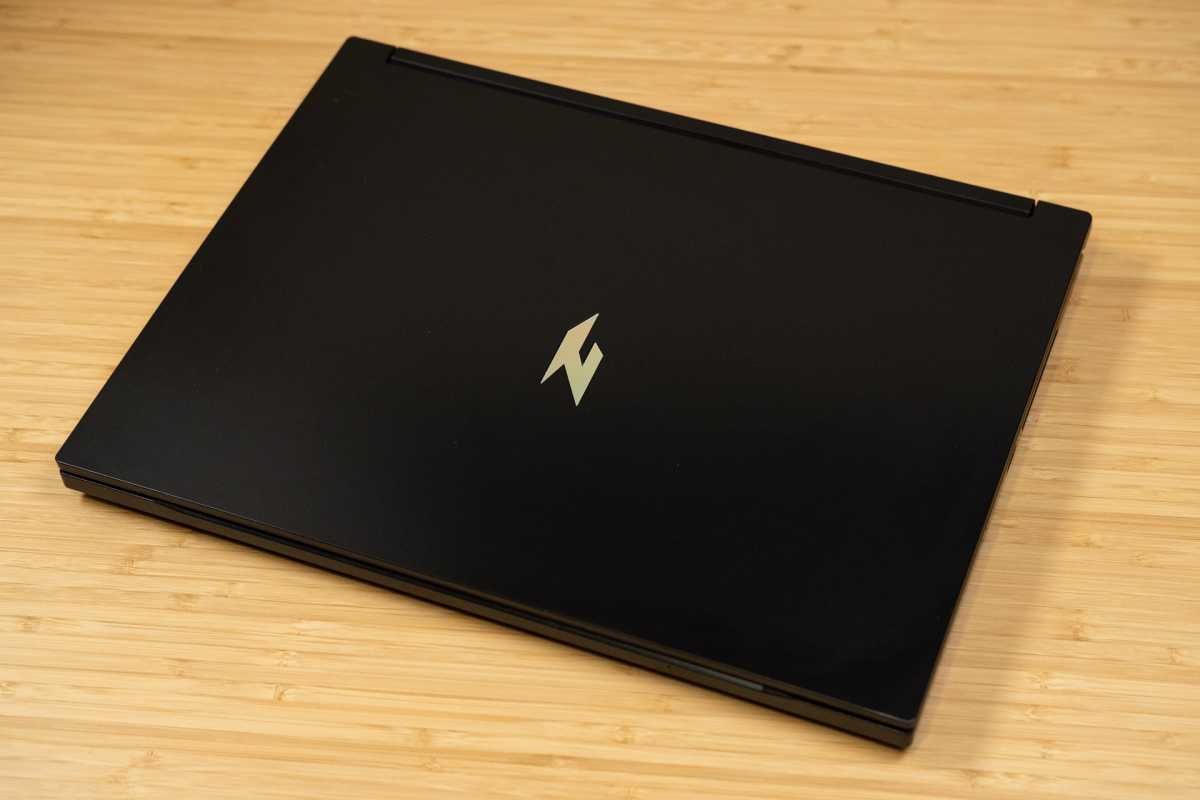
IDG / Ryan Whitwam
When it’s closed, the Acer Nitro V 16 doesn’t scream “gaming PC,” but it does cut an imposing silhouette with its 16-inch display and thick 1.24-inch profile. It’s an all-black affair, save for the silver Acer Nitro logo in the middle of the lid. Opening the lid, there’s another inlaid Nitro logo on the wrist rest and one below the display.
The Nitro V16 is all plastic, and you will notice that immediately upon touching it. It doesn’t seem cheaply made, but you can feel the plastic body flexing around the trackpad and cooling vents. While plastic might not be as robust as metal, the Nitro V 16 feels generally sturdy. The hinge is smooth, if a bit stiff. However, it stays put, and there’s next to no wobble, even when you pound away on the keyboard.
The chassis has tapered edges that make it a bit easier to pick up, but it’s got more heft than a business laptop, even with the plastic body. This laptop weighs in at 5.5 pounds, which is heavy compared to most laptops but competitive for a 16-inch gaming PC. I like the oversized rubber feet on the underside, which help keep the machine from moving around on your desk.
The Nitro V 16 has fewer ports than you’ll find on a productivity laptop or a higher-end gaming machine. It’s more than good enough for the average gamer, though. You get two high-speed USB-A ports, one on each side. There’s also a full Ethernet port on the left side. Around back, you get the DC power plug, HDMI out, and the laptop’s lone USB-C port. This isn’t a convenient location for that port, but at least it’s fast, with support for USB4 at 40Gbps.
The Acer Nitro V 16 has a robust cooling system featuring two internal fans that pull in air from the top and bottom of the machine. That’s handy if one of the vents is temporarily obstructed, but you can hear the fans droning through the large vents above the keyboard.
Warm air is accelerated out the sides of the PC through sizable exhaust ports, maintaining low thermals inside the machine. You might have to watch where you put your mouse—the exhaust blasts outward a good distance from the computer and it is hot.
Next to the cooling vents, the V 16 has a small glowing button to switch performance modes. With each press, the color changes and the system overlay tells you which mode you’ve activated. This is a handy way to switch from battery-efficient modes to high-power for playing games. Alternatively, you can press the “Nitro” key to launch the performance tuning client for even more control.
Acer Nitro V 16: Display and Speakers
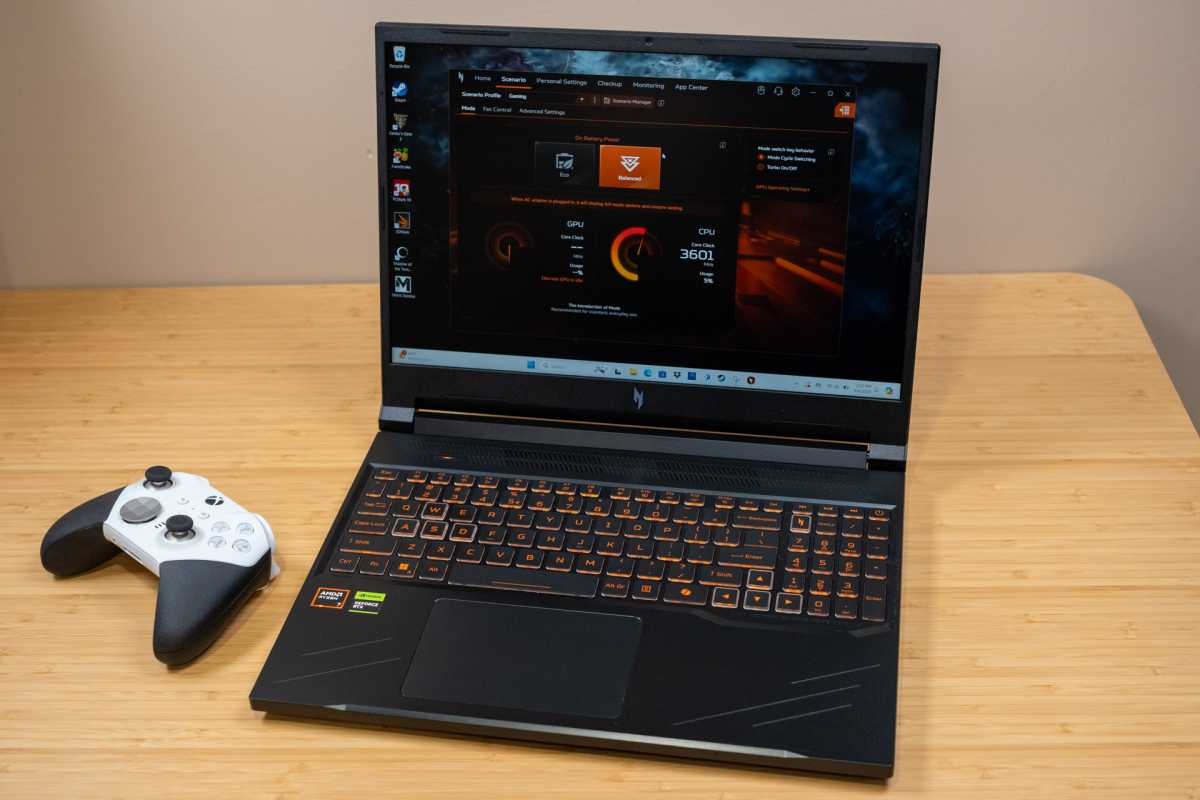
IDG / Ryan Whitwam
This 16-inch IPS LCD has a resolution of 1920×1200 and a refresh rate of 165Hz. There’s plenty of screen real estate, but there’s no option for a touchscreen here. That’s fine, considering it has a standard non-convertible hinge and it’s aimed mostly at gamers. There’s a 720p webcam squeezed in just about the screen. It’s fine in a pinch, but the picture is grainy and flat. There’s no support for IR-based Windows Hello, so you’ll need to use a password or PIN to unlock this laptop.
The display brightness is on the weak side at 300 nits, but the colors and viewing angles are good for the price. You could spend a few hundred more to get a sharper LCD or even an OLED, but this panel is great for gaming, particularly if you’re into twitchy shooters like Fortnite or Counter-Strike. The RTX 4060 has no trouble rendering modern games at 1200p, and the 165Hz refresh rate offers smooth movement in fast-paced scenes.
The stereo speakers are tucked under the edge of the laptop, which is true of most notebooks. The speakers get reasonably loud, but the audio is hollow and garbled at high volumes. The sound is serviceable as long as you leave it at a modest level. If you want more immersive sound, you’ll need headphones or external speakers.
Acer Nitro V 16: Keyboard and trackpad
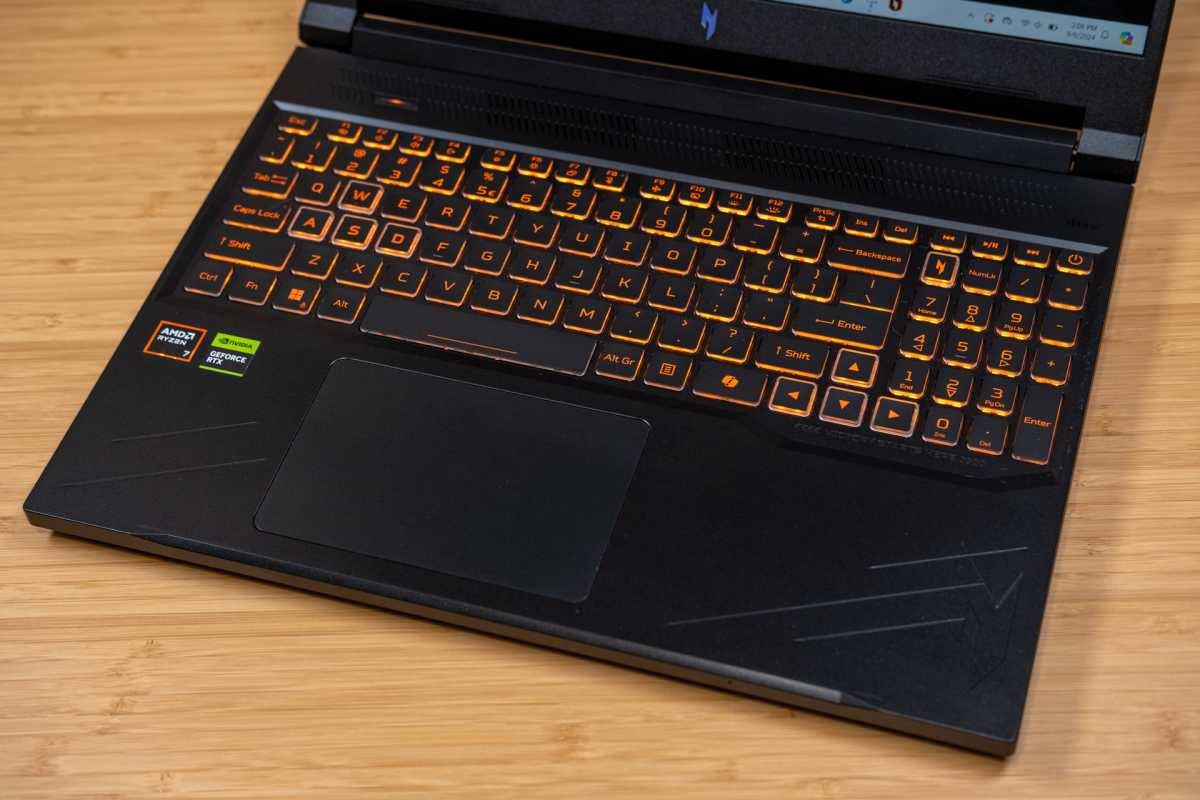
IDG / Ryan Whitwam
The keyboard on this machine could be a little divisive. This PC offers a quiet, soft typing experience. On the flip side, the keys aren’t very tactile, and the bottom-out is too mushy. These qualities won’t matter if you’re primarily playing games on the Nitro V 16, but it’s not ideal for typing long documents.
At just over 14 inches wide, the Nitro V 16 is just large enough to offer an expanded keyboard layout—you’ll find a full number pad to the keyboard’s right, but the keys are only about 60 percent as large as normal keys. That makes the pad a little too cramped for my taste, but some may still be happy they have a number pad at all on a 16-inch laptop
I was very happy to see that Acer also made room for full-sized arrow keys. Most modern laptops shrink those keys down to save space, but that makes them harder to find by touch. And right next to the arrow, Acer has included the now-customary Microsoft Copilot key.
The keys themselves are backlit with orange LEDs—no color options here. The WASD cluster also has a bit more shine-through surface to set it apart from the rest of the deck. Similarly, there’s a small dimple on W to make it easier to find by touch. It’s not the most elegant look, but the Nitro V 16 isn’t about subtlety.
The Acer Nitro V 16 has a large enough trackpad, but it seems like it could be bigger given the amount of unused real estate below the keyboard. It’s just your standard touchpad, no glass or more exotic materials. I found it to be a very responsive pad, though. Tapping, dragging, and other gestures are detected reliably and accurately.
Acer Nitro V 16: Performance
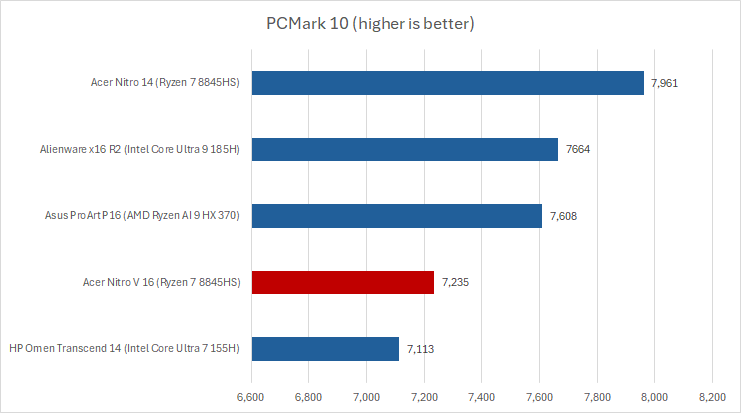
IDG / Ryan Whitwam
PCMark 10 is designed to test a machine across a variety of metrics like web browsing, video chat, and photo editing. The Acer Nitro V 16 scores 7,235, which is competitive but a little behind similar laptops, including the Acer Nitro 14. CPU performance is a primary factor with PCMark, so shifting from the default Balanced performance mode to Performance bumps the PCMark score by about 300 points.
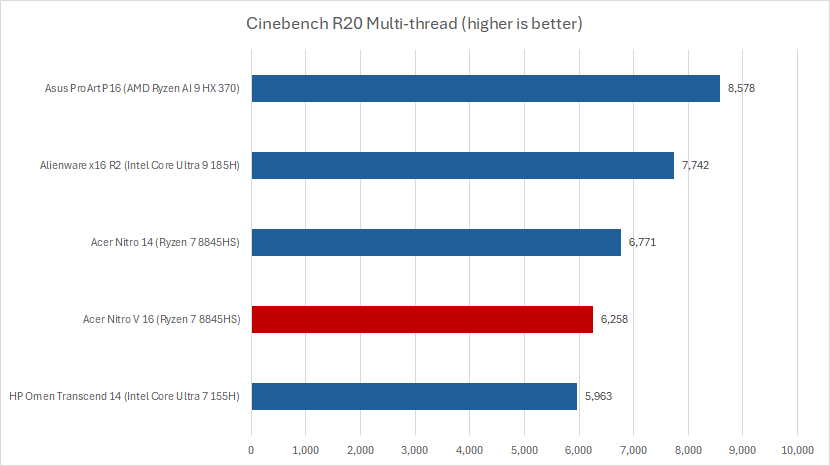
IDG / Ryan Whitwam
Cinebench is a CPU-focused test that shows how a PC handles heavy but brief multi-core workloads. More CPU cores grant higher scores in Cinebench and cooling doesn’t matter very much. The Nitro V 16 scored 6,258 in this test, which is higher than many Intel-powered laptops. Again, the similarly equipped Acer Nitro 14 runs just a little ahead with the default performance tuning.
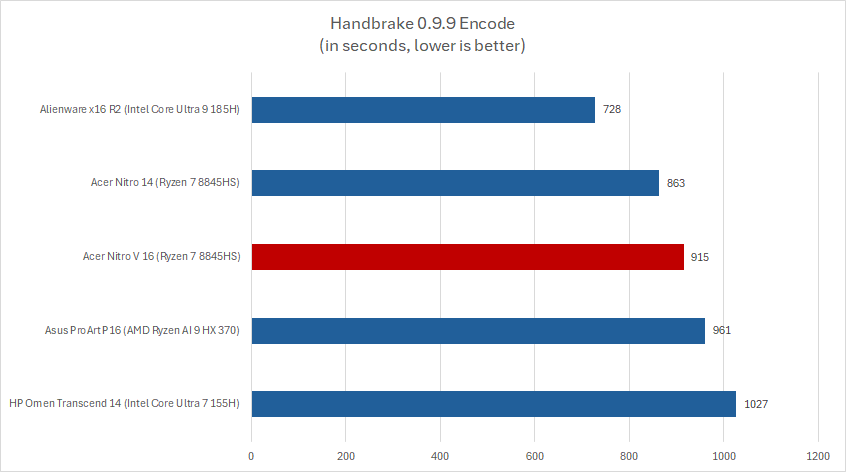
IDG / Ryan Whitwam
The Handbrake test is similar to Cinebench in that it shows how a computer handles multithreaded tasks, but this is a longer-duration test where thermals matter more. This laptop manages 6,258 in Cinebench. The robust cooling solution pays off, keeping the Nitro V 16 competitive with more expensive laptops.
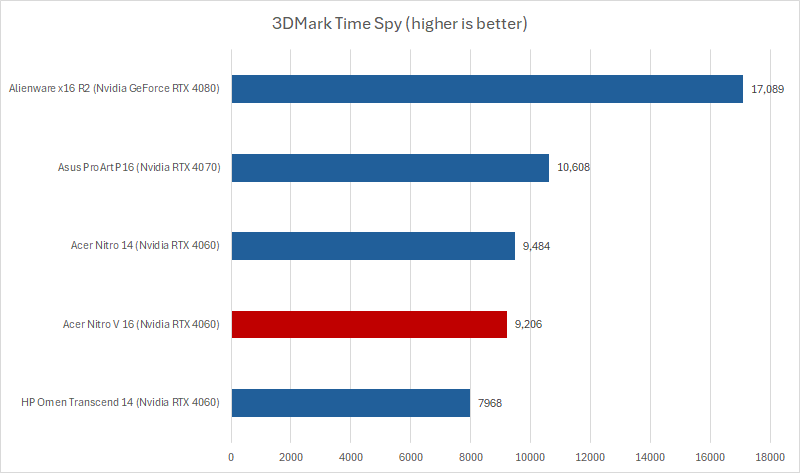
IDG / Ryan Whitwam
Our first gaming test is 3DMark Time Spy, a graphical benchmark that focuses on GPU performance. At 9,206, the Acer V 16 offers fantastic game performance, running even or slightly ahead of other RTX 4060 machines. It takes an RTX 4070 or higher to consistently beat this laptop in 3DMark, but those machines are much more expensive. For example, the Alienware x16 R2 is about the same size and weight and it leaves this machine in the dust, but it also costs twice as much.
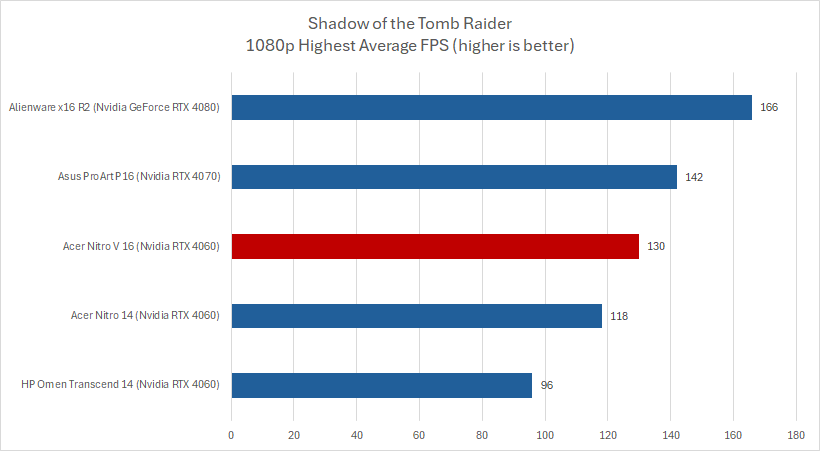
IDG / Ryan Whitwam
Game benchmarks like the one included with Shadow of the Tomb Raider can help us understand a system’s real world gaming experience. With an average frame rate of 130, the Acer Nitro V 16 definitely establishes its gaming chops in this benchmark. This frame rate is better than numerous RTX 4060 machines we’ve tested and it almost matches some RTX 4070 laptops.
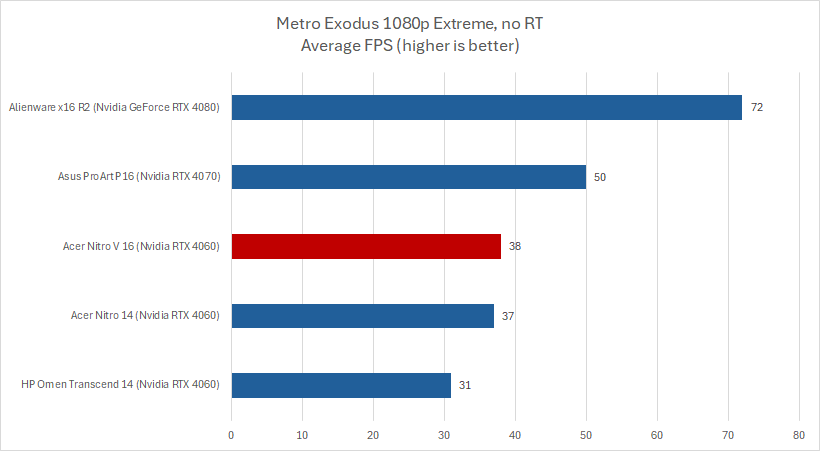
IDG / Ryan Whitwam
The Metro Exodus benchmark is a bit more demanding, giving higher-specced machines a chance to shine. However, the V 16 still reaches an average of 38 fps, which is more than competitive with gaming laptops with similar components.
Overall, I’ve been very happy with the Acer Nitro V 16’s performance. While the CPU falls a little behind in some benchmarks, that’s not something you’ll notice in daily usage. Across productivity and gaming, this machine never left me waiting. The GPU isn’t the best around, but it’s more than powerful enough to run modern games on the 1200p LCD at high frame rates. However, the display does not have G-Sync support to reduce tearing at high frame rates.
It might not handle the most demanding visual enhancements (e.g. ray tracing) as well as more expensive GPUs, but it nails the basics.
Acer Nitro V 16: Battery life
Despite weighing about the same as comparable gaming PCs, Acer only managed to fit a 56Wh battery in the Nitro V 16. That’s closer to what we’d expect for a mid-range productivity PC and it’s much smaller than the 76Wh cell in the Acer Nitro 14. It comes with a 135W charging brick that connects to the DC barrel port. You can also charge the machine over USB-C but it fills more slowly and won’t run in performance mode when powered by USB-C.
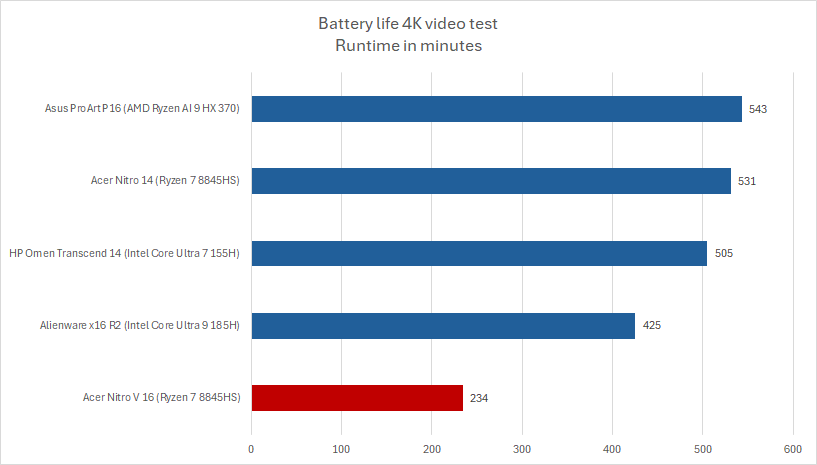
IDG / Ryan Whitwam
Our battery test consists of playing a 4K copy of Tears of Steel on repeat with the screen at 250 nits until the laptop runs out of juice. The V 16 brings up the rear in our rundown test at 234 minutes (just shy of four hours), which is about what I’d expect given the big display and small battery.
In general, you can expect a little more time per charge in daily use by keeping the display brightness lower—we had to turn it most of the way up to keep the benchmark consistent. I’d estimate around four or five hours of productivity usage on battery, but games will drain it much faster. That makes the V 16 more a poor choice for gaming on the go. If you can’t find a power outlet, this laptop just won’t last very long.
Acer Nitro V 16: Conclusion
Even at the MSRP of $1,099 to $1,129, the Acer Nitro V 16 offers a fantastic value and it’s usually discounted to under $1,000. For that sum, you get a big, fast display that’s great for twitchy games and the RTX 4060 has enough horsepower to run almost any modern title at medium or high settings. You could spend a little more to get even better gaming performance or an OLED display, but the V 16 is a good value for the mid-range.
Just don’t expect to take the show on the road—with a meager 56Wh battery, I found the battery life to be substandard. No gaming laptop is going to frag forever on battery, but this one doesn’t even last as long as most.
The keyboard isn’t the prettiest, nor does it feel particularly good, but it’s fine for gaming. The machine also has a distinctively “gamer” vibe that won’t fit in at the office. These shortcomings are not deal breakers, but don’t buy this machine for dual productivity/gaming duty.

